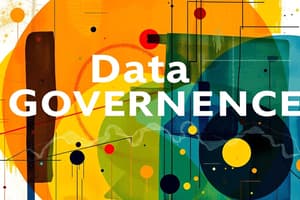Podcast
Questions and Answers
What is the primary purpose of data governance?
What is the primary purpose of data governance?
- To integrate data from multiple sources
- To ensure the overall management of data availability, usability, integrity, and security (correct)
- To develop new data storage technologies
- To store large amounts of data effectively
Which of the following is NOT a key component of data governance?
Which of the following is NOT a key component of data governance?
- Data Stewardship
- Data Encryption (correct)
- Metadata Management
- Policies and Standards
What role do data stewards play in data governance?
What role do data stewards play in data governance?
- Ensure data is stored in a cloud environment
- Create data for business applications
- Oversee the implementation and adherence to governance policies (correct)
- Develop technological solutions for data storage
Which benefit of data governance is associated with improving the accuracy and reliability of data?
Which benefit of data governance is associated with improving the accuracy and reliability of data?
In the context of data integrity, what does 'accuracy' refer to?
In the context of data integrity, what does 'accuracy' refer to?
Which of the following processes is essential for effective data governance implementation?
Which of the following processes is essential for effective data governance implementation?
How does improved data governance contribute to regulatory compliance?
How does improved data governance contribute to regulatory compliance?
What aspect of data governance enhances stakeholder trust?
What aspect of data governance enhances stakeholder trust?
What does completeness in data integrity entail?
What does completeness in data integrity entail?
Which method is primarily used to prevent unauthorized data modifications?
Which method is primarily used to prevent unauthorized data modifications?
What aspect of data integrity ensures data conforms to specified standards?
What aspect of data integrity ensures data conforms to specified standards?
How does ensuring data integrity benefit decision-making processes?
How does ensuring data integrity benefit decision-making processes?
Which practice helps maintain data accuracy and reliability over time?
Which practice helps maintain data accuracy and reliability over time?
Flashcards
Data Consistency
Data Consistency
Maintaining uniform data across different databases and systems to prevent discrepancies.
Data Completeness
Data Completeness
Ensuring all essential data is present and no critical information is missing.
Data Validity
Data Validity
Confirming data adheres to specified formats, standards, and business rules.
Data Timeliness
Data Timeliness
Signup and view all the flashcards
Data Integrity Benefits
Data Integrity Benefits
Signup and view all the flashcards
Data Governance
Data Governance
Signup and view all the flashcards
Data Integrity
Data Integrity
Signup and view all the flashcards
Data Stewardship
Data Stewardship
Signup and view all the flashcards
Data Quality Management
Data Quality Management
Signup and view all the flashcards
Data Accuracy
Data Accuracy
Signup and view all the flashcards
Data Quality
Data Quality
Signup and view all the flashcards
Data governance framework
Data governance framework
Signup and view all the flashcards
Metadata Management
Metadata Management
Signup and view all the flashcards
Study Notes
Data Governance
- Data governance manages data availability, usability, integrity, and security
- It involves processes, roles, policies, standards, and metrics to ensure efficient information use
- Key components include policies and standards (clear policies for data quality, privacy, and compliance); data stewardship (assigning responsibilities for implementing and adhering to data governance policies); data quality management (ensuring data accuracy, completeness, consistency, and timeliness for decision-making); and metadata management (managing data about data, including definitions, lineage, and usage)
Data Governance Implementation
- Framework development aligns with organizational goals and regulations
- Process and workflow definitions for data creation, storage, usage, and retirement
- Using technology solutions (data catalogues, data quality tools, compliance software) to support data governance activities
Data Governance Benefits
- Improved data quality enhances accuracy and reliability, leading to better decision-making
- Ensures compliance with data-related regulations and reduces legal risks
- Streamlines data management processes, increasing efficiency and reducing costs
- Builds trust among stakeholders by ensuring responsible and transparent data management
Data Integrity
- Data integrity refers to data's accuracy, consistency, and reliability throughout its lifecycle
- Ensures data remains unaltered and authentic, preserving original value
Data Integrity Key Components
- Accuracy ensures data is correct and free of errors
- Consistency maintains uniformity across different databases and systems
- Completeness ensures all required data is present
- Validity ensures data adheres to defined formats and standards
- Timeliness ensures data is current and relevant to current affairs
Data Integrity Implementation
- Data validation checks and rules validate data upon entry
- Audits identify and correct inaccuracies and inconsistencies
- Access controls prevent unauthorized modifications
- Robust backup and recovery procedures safeguard data from loss or corruption
Data Integrity Benefits
- Enhanced decision-making from accurate and reliable data
- Meet regulatory requirements, reducing legal issues
- Improved operational efficiency through reduced errors and rework
- Builds trust among stakeholders through trustworthy and dependable data
Studying That Suits You
Use AI to generate personalized quizzes and flashcards to suit your learning preferences.




